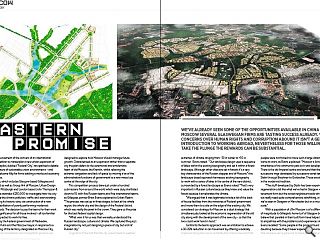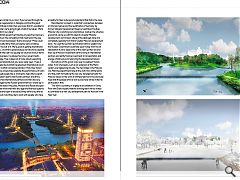Moscow Federal City
30 Oct 2012
We’ve already seen some of the opportunities available in china but in Moscow several Glaswegian firms are tasting success already. With concerns over human rights and corruption abound it isn’t a gentle introduction to working abroad, nevertheless for those willing to take the plunge the rewards can be substantial.
Russia’s announcement of the winners of an international design competition to masterplan a new urban expansion of the Russian capital, dubbed ‘Federal City’, has sparked a debate around the future of sustainable urban environments – and provided a welcome fillip for firms battling a moribund economy closer to home.The team, which includes Glasgow based Gillespies and Buro Happold as well as Group Ark of Moscow, Urban Design Associates of Pittsburgh and London based John Thompson & Partners, were awarded €250,000 to investigate how the city could manage the chronic pollution, traffic and overcrowding issues afflicting its historic core, via construction of a new ‘city’ and rehabilitation of poorly performing modernist neighbourhoods. The decision to pay the teams for their work carried real significance for all those involved - all too familiar with being expected to work for free.
Devised by the Federal government of Medvedev, continued by Putin and the Moscow mayor, in response to a recent doubling of the territory designated as Moscow City, the international consultation and competition process was designed to explore how Moscow should manage future growth. Characterised as an expansion rather than a separate city the plan defers to the ceremonial and emblematic heart of old Moscow, the Kremlin, whilst relieving the extreme congestion and lack of space by moving a lot of the administrative functions of government to a new mixed use centre at the edge of the city.
This competition process drew just under a hundred submissions from around the world which were duly shortlisted down to 10, with five Russian teams and five international teams, as Gillespies partner Brian Evans explained to Urban Realm: “The process was set up in three stages, to look at the whole region, the whole city and the design of the Federal district which was really the jewel in the crown. They gave us the prize for the best federal capital design.
“What won it for us was that we really understood the Russian landscape, culture and climate. We captured the jury’s imagination by not just designing a piece of city but a bit of Russian city.”
Cognisant of the fact that the city would need to weather extremes of climate ranging from -30 in winter to +30 in summer. Evans noted: “Our landscape design used a sequence of lakes within the existing topography and set it within a forest landscape. Although other cities are set in forests it’s a very key characteristic of the Russian steppes and of Moscow.“ this landscape based approach harnesses existing topography to work with a series of lakes in the centre of the new district, surrounded by a forest landscape as Evans noted: “That’s very important in Russian culture because they know and value the forest because it ameliorates the climate.
“We argued that it was legitimate to take a lot of the back of house facilities from the ministries of Federal government and move them to a site on the edge of the existing city. We considered our strategy for Moscow as a dual strategy that simultaneously looked at the economic regeneration of the old city along with the development of the new city - so that the two could work hand in hand.”
Central to the teams approach was an ambition to achieve a 30-35% reduction in car movement by offering a radically improved rail system and a redistribution of land use such that people were not forced to move such a large distance from home to work, as Evans explained: “Moscow is living with the inheritance of its communist past so it was developed radially. There is the old Imperial centre and around that there are successive rings developed by successive soviet leaders from Stalin through Brezhnev to Gorbachev. Those are all developed in the modernist tradition.
“The stuff developed by Stalin has been experiencing urban regeneration a bit like what we’ve had in Glasgow with the tenement form but the soviet neighbourhoods which are further out really need quite comprehensive retrofitting, a bit like what we’ve seen in Glasgow or Manchester but on a much bigger scale.”
With a population of c11m Moscow is of a different order of magnitude to Gillespie’s home turf of Glasgow but Evans believe that parallels in their built form have helped their team to empathise with the problems and experiences of Muscovites. Evans recalled: “Some people in the process found it quite daunting because they’d never experienced environments like that whereas we’ve gone out to these peripheral areas and found them very similar to our own. If you’ve lived through the period of urban regeneration in Glasgow, and had the good fortune to contribute to that, then you know that it’s possible for a city to say ‘listen we’re going to get a hold of ourselves’. We’re going to transform our place’”.
With the British government touting an export led recovery is there anything in the competition that might point the way ahead to grow local businesses? Evans answered: “More could be done practically rather than just saying ‘we’re a trading nation’ and all the rest of it. We’re good at getting international people in here… and that’s good because we have to be capable of working with the best- but equally we could do more in terms of assistance overseas. I’ve always found our governments to be a bit stodgy. They make a lot of noise about supporting companies internationally but you never really see it. There is more that people like Scottish Development International could do to support Scottish companies abroad. I think they should start an initiative where they celebrate the performance of Scots overseas and get people like us involved to help others export.
“All the western teams had Russian partners and all the Russian teams had international partners and that was very much encouraged by the Russian government so I would say in spite of what we read in the press, Moscow and Russia are open for business. We know that their law, legal and financial systems are a bit arcane and open to abuse but they want to try and do something about it and they like to work with people who have empathy for their culture and understand that that is the case.
Described as ‘a project in scale that’s somewhere between an Olympic Games and the reunification of Germany’ by former Glasgow Development Agency head Stuart Gulliver, Moscow City is anything but unambitious. Gulliver, the schemes economist, came up with this idea of a Greater Moscow Development commission where all the deals get done and completely separate from that a Greater Moscow development bank. He used the German reunification bank to explain how the Russian Government could take seed money from the oil stabilisation fund to seed some of this clean up their act and then use a Moscow Investment bank to bring in international partners and jointly finance investment in transportation and energy infrastructure to help bring the development about.
But will any of this grand vision ever be realised? Evans notes: “A lot of projects, such as an extension of the Metro system, are happening anyway, The next stage is the Moscow City Planning Department take all the work from all the teams and they start formulating the new city development plan for Moscow based on the work of all these teams and we obviously hope that the people who’ve won a prize here will be invited to participate in that.
The work is currently on display at an exhibition in Gorky Park with Evans hopeful that the winning team will be invited to contribute to a new city development plan for Moscow in the New Year.
Read next: Booze views
Read previous: Autumn manifesto
Back to October 2012
Browse Features Archive
Search
News
For more news from the industry visit our News section.
Features & Reports
For more information from the industry visit our Features & Reports section.




